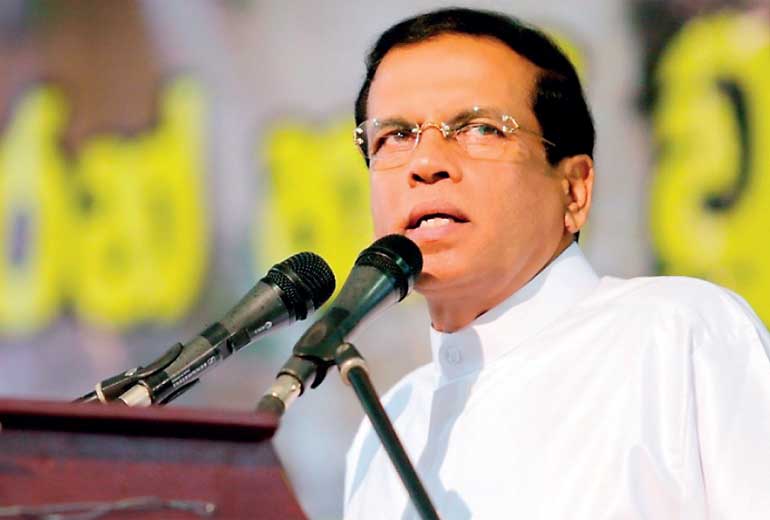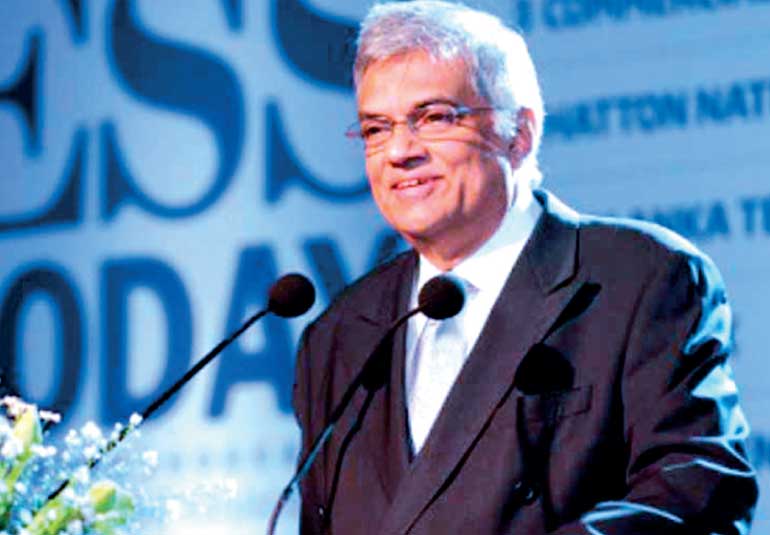Saturday Feb 14, 2026
Saturday Feb 14, 2026
Tuesday, 19 April 2016 00:20 - - {{hitsCtrl.values.hits}}
Soon after the end of war in May 2009, the Secretary General of the United Nations visited Sri Lanka and at the end of the visit there was a joint declaration by the President of Sri Lanka Mahinda Rajapaksa and the Secretary General of the United Nations Ban Ki-moon. The following was stated in the last paragraph of the Joint Statement:
“Sri Lanka reiterated its strongest commitment to the promotion and protection of human rights, in keeping with international human rights standards and Sri Lanka’s international obligations. The Secretary General underlined the importance of an accountability process for addressing violations of international humanitarian and human rights law. The Government will take measures to address those grievances.”
 President Maithripala Sirisena
President Maithripala Sirisena
The resolution A/ HRC/30/L.29 was jointly sponsored by United States of America and Sri Lanka at the 30th session of the UN Human Rights Commission in September 2015 and was unanimously approved in October 2015. The following was stated in the sixth paragraph of the said resolution:
“Welcomes the recognition by the Government of Sri Lanka that accountability is essential to uphold the rule of law and to build confidence in the people of all communities of Sri Lanka in the justice system, notes with appreciation the proposal of the Government of Sri Lanka to establish a judicial mechanism with a special counsel to investigate allegations of violations and abuses of human rights and violations of international humanitarian law, as applicable; affirms that a credible justice process should include independent judicial and prosecutorial institutions led by individuals known for their integrity and impartiality; and also affirms in this regard the importance of participation in a Sri Lankan judicial mechanism, including the special counsel’s office, of Commonwealth and other foreign judges, defence lawyers and authorised prosecutors and investigators.”
In January 2016, President Maithripala Sirisena in an interview with BBC said that foreign judges and prosecutors should not be involved in an investigation into allegations of war crimes. “We have more than enough specialists, experts and knowledgeable people in our country to solve our internal issues,” he said.
“This investigation should be internal and indigenous, without violating the laws of the country, and I believe in the judicial system and other relevant authorities in this regard. The international community need not worry about matters of State interest.” The President reiterated this subsequently in an interview with Al Jazeera and at a speech given at the National Law Conference in Wadduwa.
In late January Prime Minister Ranil Wickremesinghe in an answer to a query of Channel 4 News said that the Government hadn’t ruled out foreign involvement in the proposed war crimes investigation. He further stated: “Yes… We are standing by our commitment to the Geneva resolution.”
In February Foreign Minister Mangala Samaraweera said in Washington that he was willing to consider international participation in investigating possible war crimes during the 26-year Tamil insurgency.
 Prime Minister Ranil Wickremesinghe
Prime Minister Ranil Wickremesinghe
“I think it is only fair that the victims of the war would want some form of guarantee that the new courts will deliver justice and accountability in a fair manner, and for that we are willing to consider the participation of international actors… They could be judges, they could be forensic experts, investigators, prosecutors, all these options are being looked at.”
UN High Commissioner for Human Rights Prince Zeid Ra’ad Al Hussein, who visited Sri Lanka in February, said it was Sri Lanka’s sovereign right to decide on the involvement of foreign judges in a mechanism set up to investigate alleged war crimes. However, he criticised the Sri Lankan Judiciary of being highly-politicised over the years and therefore emphasised the importance of the involvement of foreign components to ensure a credible and impartial investigation into such violations.
In March the UN Secretary General’s Deputy Spokesman Farhan Haq said the Human Rights Council could evaluate for itself how the process of the probe should proceed, but the UN wanted to make sure there was a credible investigation into the allegations. “We have made clear what our guidelines are and what a credible investigation will entail. So we will continue to be in dialogue to make sure it happens.”
In Parliament delivering his maiden speech, Minister Sarath Fonseka called for the participation of international observers and advisors for UN inquiry on alleged war crimes in Sri Lanka. He said that there needed to be no fear about international participation. He led the Army according to the international law. Allowing foreign participation will increase the credibility of the inquiry, he added.
It seems to be that the Sri Lankan Government is totally in disarray in respect of foreign participation of the possible inquiry of violation of international law during the war by both parties.
Investigating violations and reconciliation
During the past regime Sri Lanka had a notorious reputation internationally that the regime did not stand by the commitments made. It took an unprecedentedly long time to implement recommendations of its own LLRC. Some recommendations are not yet implemented. The main reason is that the fear of response of the Sri Lankan polity, mainly the majority Sinhalese.
Many a time it was argued as follows. “Any action to rake up the past now will be counter-productive particularly to the Tamils who have been the victims of the brutal past. The Tamils right now are aiming get away from the past and look towards the future. They have been the worst victims of the past which they want to forget. Any action by the international community should be to heal the wounds of the Tamil people. The Western concept of raking up the past for reconciliation is not going to work in Sri Lanka.”
It was also implied that Sinhalese were of the view that it was in order to carry out illegal acts of harming even the civilians to destroy the LTTE which had no sense of legality.
Therefore there is a concept in general that both Tamils and Sinhalese do not want to dig into the past and it was only the Western countries are asking for it. This is not true. On the part of the right-thinking Sinhalese, it is a gross insult to them. On the part of the Tamils, it is suppression of their feelings towards their loved ones especially civilians who were killed during the war.
On the part of the Government, according to early reports there were zero casualties. Much later the Government admitted that there were around 7,000 casualties. Therefore the real picture was hidden from the Sinhalese. On the part of the armed forces, there was no necessity to exercise undue force on the LTTE since during the latter part of the war it was eminent that the LTTE was going to lose. Therefore as Commander of the Army during the war Sarath Fonseka stated, these charges should be investigated not only for the sake of the Tamil victims but also to re-establish the credibility of the Army. He said he had given legal orders and if there were soldiers who had acted illegally or if there was anybody who had given illegal orders, they should be punished.
Therefore who creates this mentality that there would be uprising of the Sinhalese if there would be investigations about violations of international law during the war? Those who supported illegal orders, if any.
Shouldn’t we investigate this if there were international allegations that 40,000 civilians were killed and there were brutalities against the Tamil civilians? On the other hand shouldn’t we investigate this in order to re-establish the credibility of the Army which defeated the most dangerous terrorist group which was hitherto believed to be undefeatable? They lost the credibility due to these charges levelled against them. This is neither Western thinking nor so-called Sinhala Buddhist thinking nor Tamil nationalist thinking. This is pure Sri Lankan thinking.
Ensuring a credible investigation
According to the UNHRC resolution, it is not mandatory to have foreign judges in the bench. They can be observers. Therefore, the President is correct to that extent. But we should ensure a credible investigation. If the President thinks that the Judiciary is now impartial just because he does not interfere with the Supreme Court decisions contrary to the behaviour of his predecessor, he is sadly mistaken.
It was he who appointed the Judge to the Supreme Court who had to step down with serious allegations. By the time he was appointed to the SC, he had similar allegations and the President and the Government were blind-eyed to those. There is a Magistrate who repeatedly violated laws of the land by illegally keeping an elephant calf. No action is being taken by the Judicial Services Commission.
There is a SC Judge who was at the bench when the anticipatory bail application of Gotabaya Rajapaksa was heard. The decision  was in favour of Rajapaksa and the decision was criticised by many. This Judge did not participate a similar case filed by Basil Rajapaksa, citing the reason that the family was known to the Judge.
was in favour of Rajapaksa and the decision was criticised by many. This Judge did not participate a similar case filed by Basil Rajapaksa, citing the reason that the family was known to the Judge.
There is a SC Judge who was earlier punished by the JSC for giving intentionally wrong judgments, appointed by the current President. The Magistrate who refused the bail application of Yoshitha Rajapaksa was criticised by the High Court Judge. Sometime back Transparency International alleged that the Judiciary was the most corrupt institution in Sri Lanka after the Police. Therefore, participation of foreign judges improves the credibility of the whole process.
We have precedence for this. Prime Minister Sirima Bandaranaike appointed a commission under the Commissions of Inquiry Act of 1963 in addition to the usual judicial process to probe S.W.R.D. Bandaranaike’s assassination comprising Justice Abdel Younis of Egypt, Justice G.C. Mills-Odich of Ghana and our own Justice T.S. Fernando who heard the case in local courts.
Neutral umpires the need of the hour
In test cricket, the concept of neutral umpires was first introduced in Pakistan in November 1986 at a test series with West Indies. Earlier there were accusations that the home umpires were biased towards the home side. Accusations were levelled against Australia, India, Pakistan and Sri Lanka. Therefore this initiative was taken by Pakistan Captain Imran Khan, who later said that it was a part of physiological war against legendary West Indies team captained by Clive Lloyd.
Two umpires from India were invited and the five match series was won by West Indies 3-1. Imran Khan later said that to win a match and stop the defeat in the other was itself a big achievement. Later ICC has taken the baton from Imran Khan. In the present day context, if there are no neutral umpires we can imagine the outrage if a home umpire appears guilty of favouritism.
This is the very reason we need foreign judges in the probe initiated by UNHRC especially in a highly-polarised polity based on ethnicity in Sri Lanka. The President has no right to hamper the long-term interests of the country for short-term political gains and the President and the Government can decide whether we need neutral umpires or home umpires.